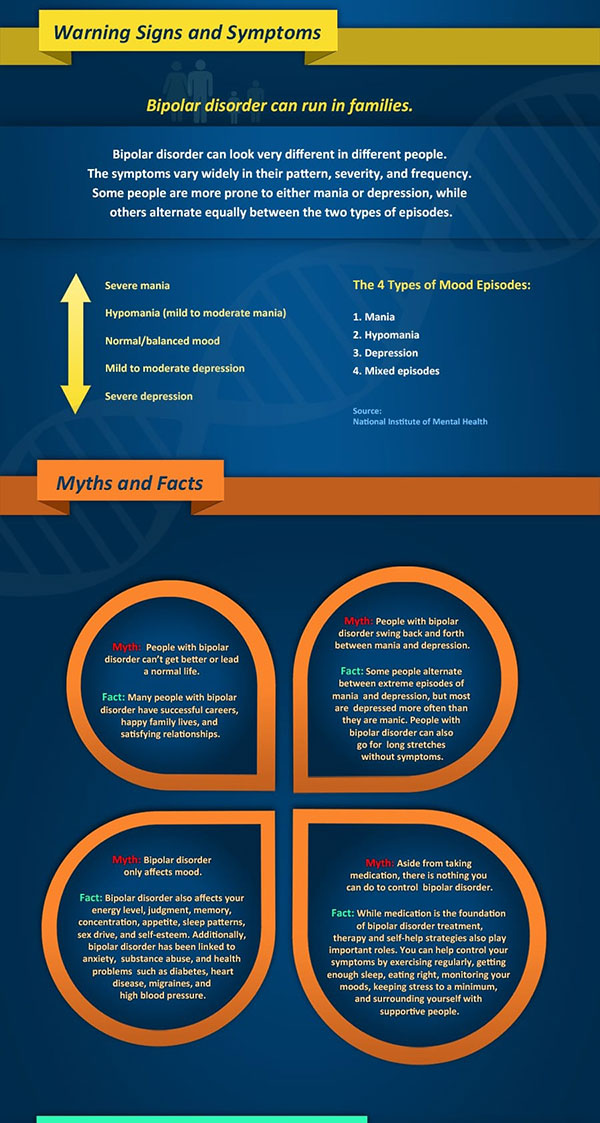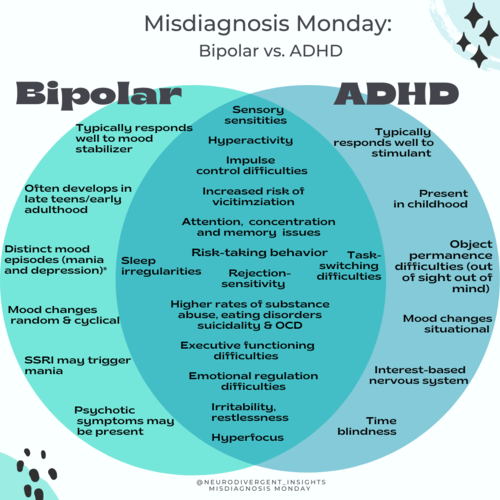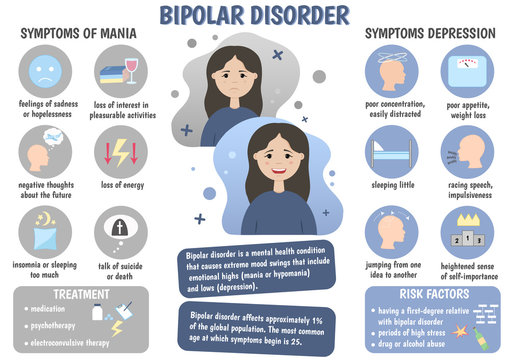Uncover the subtle hints that may signal a deeper issue with our list of 10 signs of bipolar disorder.
Table of Contents
- Introduction to Bipolar Disorder
- What is Bipolar Disorder?
- Sign: Feeling Very Happy or ‘Up’
- Sign: Sleep Troubles
- Sign: Lots of Energy or Very Little Energy
- Trouble with Day-to-Day Tasks
- Sign: Rapid Talking or Movement
- Sign: Not Enjoying Fun Things
- Sign #8: Getting Easily Distracted
- Sign #9: Eating Too Much or Too Little
- Sign: Feelings of Being Very Important or Unimportant
- How to Help Someone Showing These Signs
- Conclusion: Understanding Is the First Step
- Frequently Asked Questions (FAQs)
Introduction to Bipolar Disorder
Have you ever felt really happy one day and then really sad the next? Well, imagine feeling those extreme ups and downs all the time. That’s what it’s like for someone with bipolar disorder. It’s a mental health condition that can make people’s moods change in big ways. Let’s learn more about bipolar disorder and how it affects how people feel.
Imagine waking up one day feeling like you can conquer the world, like you have wings on your feet. Everything seems possible, and you’re bursting with energy. But then, the next day, you feel like you’re stuck in a dark cloud, unable to find any joy in things you used to love. This rollercoaster of emotions is what people with bipolar disorder experience.
Bipolar disorder is like having two extremes of moods – the highs and the lows. When someone with bipolar disorder is in the high phase, called mania, they might feel incredibly happy, full of energy, and even a bit hyper. But when they’re in the low phase, known as depression, they can feel deeply sad, lose interest in things they enjoy, and have trouble doing even simple tasks.
So, now that we know a bit about what bipolar disorder is, let’s explore some of the signs that can help us recognize it in ourselves or others.
What is Bipolar Disorder?
Bipolar disorder is a health condition that affects how people feel. It’s like a rollercoaster ride for the emotions. One moment, a person may feel extremely happy, and the next, they might feel very sad. This condition causes big changes in a person’s mood, making them experience intense highs and lows.
Understanding Mood Swings
Mood swings in bipolar disorder are not just quick changes like feeling happy or sad for a few minutes. These mood swings can last for weeks or even longer, making it challenging for the person to control their emotions.
Sign: Feeling Very Happy or ‘Up’
Have you ever felt so happy that you just couldn’t stop smiling and giggling? Well, imagine feeling that way all the time, but even more extreme. This is what it can be like for some people with bipolar disorder when they experience something called mania.

Image courtesy of www.gbhoh.com via Google Images
During a manic episode, a person might feel like they have endless energy, go from one activity to another without getting tired, and be super enthusiastic about everything. It’s like feeling on top of the world!
Imagine feeling so excited that it’s hard to stay still, talking super fast, and having so many ideas rushing through your head that you can’t keep track of them all. This is what mania can feel like for someone with bipolar disorder.
Feeling Really Sad or ‘Down’
One of the signs of bipolar disorder is feeling really sad or ‘down’. It’s not just regular sadness; it’s a deep and intense feeling known as clinical depression.
Imagine feeling as if the weight of the world is on your shoulders, and no matter what you do, you just can’t shake off that feeling. That’s what it’s like for some people with bipolar disorder when they experience this kind of extreme sadness.
When someone is going through a depressive episode, they might find it hard to get out of bed in the morning, have little to no energy, and lose interest in things they used to enjoy, like playing games or hanging out with friends.
It’s important to remember that feeling sad sometimes is a normal part of life, but when this sadness lingers for a long time and affects how you live your day-to-day life, it could be a sign that something more serious, like bipolar disorder, is going on.
Sign: Sleep Troubles
Sleep is super important for our bodies and minds to stay healthy. But sometimes, when someone has bipolar disorder, their sleep patterns can get all mixed up. Let’s find out how sleep troubles can be a sign of this condition.
Sleeping Too Little or Too Much During Mania or Depression
People with bipolar disorder might have trouble sleeping when they’re feeling really high-energy and happy (mania) or really sad and low (depression). When they’re in the middle of a manic episode, they might not feel the need to sleep as much, feeling like they have endless energy.
On the other hand, during a depressive episode, they might want to sleep all the time, finding it hard to get out of bed or stay awake during the day. This extreme change in their sleep patterns can be a clear sign that something is going on with their mood.
How Sleep Troubles Affect Daily Life
When someone isn’t getting enough quality sleep, it can make them feel more irritable, forgetful, and even more likely to have mood swings. This can impact their ability to focus and handle tasks, like schoolwork or chores.
It’s important for kids to know that helping someone with bipolar disorder get better sleep hygiene, like creating a calming bedtime routine or avoiding screen time before bed, can make a big difference in how they feel during the day.
Sign: Lots of Energy or Very Little Energy
When someone has bipolar disorder, their energy levels can change a lot. They might go from feeling super excited, full of energy, and unable to sit still during a period called mania. But during a different phase, called depression, they could feel like they have no energy at all, feeling tired and sluggish most of the time.

Image courtesy of www.mcgrawsystems.com via Google Images
What is Mania?
Mania is when someone with bipolar disorder feels like they can do anything and everything all at once. They may be buzzing with energy, talking fast, and taking on lots of plans and projects without realizing they’re doing too much. This high energy level can last for days or even weeks.
What is Depression?
Depression, on the other hand, is like feeling stuck in a heavy cloud. People with bipolar disorder during a depressive episode might struggle to get out of bed, not feeling motivated to do anything, and finding even simple tasks challenging. This low energy state can also last for a long time.
So, if you notice someone around you going from being super active and happy to feeling extremely tired and sad, they might be experiencing the energy fluctuations that come with bipolar disorder.
Trouble with Day-to-Day Tasks
Living with bipolar disorder can make everyday activities more challenging. It can be like trying to swim against a strong current, making it hard to keep up with schoolwork, chores, or spending time with friends.
Struggling with Responsibilities
Imagine feeling like you have a heavy backpack filled with rocks on your back while trying to do your homework or help with household tasks. This is how some people with bipolar disorder may feel when faced with daily responsibilities.
Difficulty Concentrating
Have you ever tried to focus on a game or a book, but your mind kept wandering off to other things? People with bipolar disorder might find it tough to concentrate on tasks, leading to unfinished homework or forgotten chores.
Feeling Overwhelmed
When you have a lot on your plate, like schoolwork piling up or too many activities to handle, it can be overwhelming. This feeling of being swamped can be especially tough for someone dealing with bipolar disorder.
Sign: Rapid Talking or Movement
Have you ever noticed someone who talks super fast or can’t seem to sit still? In some cases, this could be a sign of bipolar disorder. When a person with bipolar disorder is feeling manic, they might speak quickly, jump from topic to topic, or have racing thoughts that make it hard to keep up. This rapid talking is a key indicator that something might not be quite right.

Image courtesy of neurodivergentinsights.com via Google Images
Additionally, people experiencing mania might also display rapid movement. They could fidget, tap their feet, or pace back and forth frequently. This restlessness is another telltale sign of the high energy levels and impulsivity that often come with a manic episode in bipolar disorder.
Sign: Not Enjoying Fun Things
When someone is not enjoying the things they used to have fun doing, it could be a sign that something is going on with their feelings. This can happen to people with bipolar disorder when they are feeling really sad.
Why It Happens
Imagine playing your favorite game or hanging out with friends, but it just doesn’t feel as fun as it used to. People with bipolar disorder might feel this way because when they are going through a period of sadness, nothing seems to bring them joy.
Finding Support
It’s important to be understanding and patient with someone who is not enjoying fun things due to their feelings. Letting them know you are there for them and offering to spend time with them, even if they don’t feel like doing much, can make a big difference in helping them cope.
Sign #8: Getting Easily Distracted
This part will describe how focus can be hard, and someone might get distracted a lot if they have bipolar disorder.

Image courtesy of www.reddit.com via Google Images
Understanding Distraction
Picture this: you’re in class, trying to listen to your teacher explain something cool, but your mind keeps wandering to that awesome video game waiting for you at home. That’s what being easily distracted feels like. For someone with bipolar disorder, this distraction can be even stronger.
How Bipolar Disorder Impacts Focus
When someone has bipolar disorder, they might have a difficult time concentrating on what they need to do. Their thoughts bounce around like a bouncy ball. It can be tough for them to focus on one thing at a time, making daily tasks like homework or chores extra challenging.
| Signs of Bipolar Disorder | Description |
|---|---|
| 1. Extreme Mood Swings | Experiencing drastic changes in mood from extreme highs (mania) to extreme lows (depression). |
| 2. Decreased Need for Sleep | Feeling rested after only a few hours of sleep or experiencing insomnia during manic episodes. |
| 3. Impulsivity | Engaging in risky behaviors without considering the consequences during manic periods. |
| 4. Racing Thoughts | Having a rapid flow of thoughts that are difficult to control or focus on during manic episodes. |
| 5. Fatigue | Feeling tired, sluggish, or lethargic during depressive episodes. |
| 6. Difficulty Concentrating | Experiencing trouble focusing or making decisions during both depressive and manic phases. |
| 7. Changes in Appetite | Experiencing significant weight gain or loss due to changes in appetite during mood swings. |
| 8. Suicidal Thoughts | Having thoughts of death or suicide, especially during depressive episodes. |
| 9. Feelings of Hopelessness | Feeling helpless, worthless, or hopeless even when there is no apparent reason to feel this way. |
| 10. Irritability | Becoming easily irritated or agitated, leading to angry outbursts or conflicts with others. |
Dealing with Distraction
If you notice a friend or family member constantly getting sidetracked and struggling to concentrate, it’s essential to offer support. Understanding that they may need some help with focusing and finding ways to assist them can make a big difference. Remember, being patient and kind is key.
By recognizing the signs of distraction in someone with bipolar disorder and offering a helping hand, you can make their day a little brighter and smoother.
Sign #9: Eating Too Much or Too Little
We’re going to learn how bipolar disorder might change how much someone wants to eat, either a lot or very little, based on their mood.
How Mania Affects Eating Habits
During a manic episode, a person with bipolar disorder might feel like they have endless energy and may not feel the need to eat or sleep. This can lead to a decreased appetite and weight loss as they might be too busy with other activities to think about food.
How Depression Affects Eating Habits
Conversely, during a depressive episode, someone with bipolar disorder might feel a lack of energy and motivation, leading to overeating as a way to cope with their negative feelings. This can result in weight gain and an unhealthy relationship with food.
It’s important to remember that changes in eating habits can be a sign of underlying mental health issues, and seeking help from a healthcare professional is essential for managing bipolar disorder.
Sign: Feelings of Being Very Important or Unimportant
When someone has bipolar disorder, they may sometimes feel like they are the most important person in the world. This feeling is known as mania. During this time, they might believe they can do anything and that they are above everyone else. They might talk really fast and have so many ideas that they can’t keep up.

Image courtesy of stock.adobe.com via Google Images
On the other hand, when a person with bipolar disorder is feeling very unimportant, it could be a sign of depression. They might feel like they don’t matter to anyone or that everything they do is wrong. It can make them feel like they want to hide away and not talk to anyone.
How to Help Someone Showing These Signs
If you notice a friend or family member showing signs of bipolar disorder, there are things you can do to support them. Here are some tips on how to help:
Be Understanding and Patient
It’s crucial to be understanding and patient with your loved one. Remember, they may be going through a difficult time and may not always act like themselves. Show them kindness and support.
Encourage Them to Seek Help
Encourage your friend or family member to talk to a trusted adult or a mental health professional. Seeking help is an essential step towards managing bipolar disorder and getting the support they need.
Be a Good Listener
Listen attentively to your loved one’s feelings and experiences. Sometimes, all they need is someone to listen without judgment. Let them know that you’re there for them no matter what.
Offer Practical Support
Help your friend or family member with day-to-day tasks that may seem overwhelming to them. Whether it’s running errands, cooking a meal, or just spending time together, your support can make a big difference.
Educate Yourself
Take the time to learn more about bipolar disorder and how it can affect people. Understanding the condition better will enable you to provide more effective support and empathy for your loved one.
Conclusion: Understanding Is the First Step
So, we’ve learned a lot about bipolar disorder and how it can affect someone’s mood in big ways. Understanding this condition is the first step in being able to help others who may be struggling with it. By knowing the signs to watch for and how to offer support, we can make a positive difference in someone’s life.
Remember, bipolar disorder is a mental health condition that can impact how a person feels, from extreme highs to extreme lows. It’s important to be aware of these changes and to offer compassion and understanding to those who may be experiencing them.
By educating ourselves and those around us about bipolar disorder, we can create a more supportive and caring community for everyone. Let’s continue to learn, listen, and be there for one another as we navigate the complexities of mental health together.
Frequently Asked Questions (FAQs)
What is bipolar disorder?
Bipolar disorder is a health condition that affects how people feel. It can make someone’s mood change in big ways, going from really happy to very sad.
Why do people with bipolar disorder have mood swings?
People with bipolar disorder experience mood swings because their brain works differently. This means that they can feel extremely happy and full of energy one moment (mania) and then very sad and tired the next (depression).
How are mood swings in bipolar disorder different from regular mood changes?
The mood swings in bipolar disorder are more intense and can last for weeks or even longer, unlike regular mood changes that may only last for a short period of time.
Can someone have bipolar disorder and not experience mood swings?
Mood swings are a key characteristic of bipolar disorder, so it is unlikely for someone to have the condition without experiencing these extreme changes in mood.
What are some signs of mania in bipolar disorder?
Signs of mania in bipolar disorder can include feeling very happy, having lots of energy, talking rapidly, and engaging in excessive activities.
How can depression in bipolar disorder be different from regular sadness?
Depression in bipolar disorder can be more intense and long-lasting than regular sadness. People with bipolar depression may not find joy in activities they usually enjoy and may struggle with day-to-day tasks.
What should I do if I think a friend or family member has bipolar disorder?
If you suspect that someone you know may have bipolar disorder, it’s important to talk to a trusted adult, like a parent or teacher, and encourage the person to seek help from a healthcare professional. Showing support and understanding can make a big difference.





